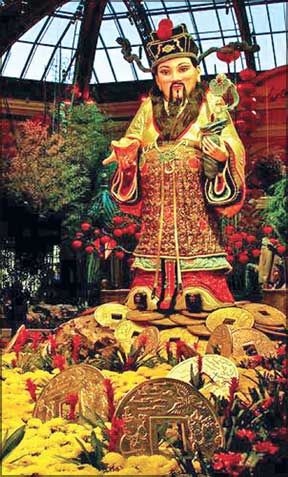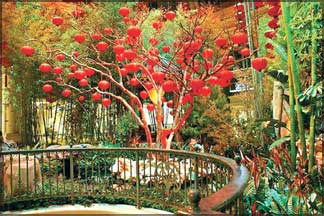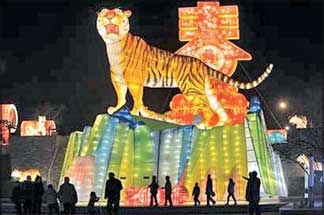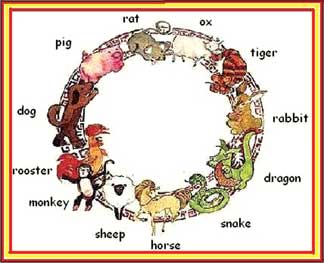|
Chinese New Year celebrates:
Year of the Tiger
Charmaine FERNANDO
In China, the most important celebration is the Spring Festival,
better known in the West as Chinese New Year falls on February 14 this
year. The Chinese calendar is based on cycles of the moon and dates back
to 2637 BC. 2003 is the Year of the Ram and begins on February 1st. It
is believed that people take on the characteristics of the animal ruling
the year they were born in.
|

Chinese New Year beliefs |
The Chinese calendar denotes 2010 as the Year of the Tiger, which is
also known by its formal name of Geng Yin. Chinese calendar has been in
continuous use for centuries. It predates the International Calendar
that is based on the Gregorian calendar which is in use at the present,
which goes back only some 430 years.
In the Indian context it is sad that the headcount of the beautiful
animal with its black and gold psychedelic shades and lines across its
body that is a symbol of power, strength and vigour, is decreasing by
the hour and sits on the edge of extinction.
For the Chinese it is a 15-day celebration of the Year of the Tiger
which comes to a climax on February 14, which ushers in a prosperous
year.
Time of reunion
For the Chinese, New Year’s Eve and New Year’s Day are a family
affair, a time of reunion and thanksgiving. The celebration was
traditionally highlighted with a religious ceremony given in honour of
Heaven and Earth, the gods of the household and the family ancestors.
The sacrifice to the ancestors, the most vital of all the rituals,
united the living members with those who had passed away.
Departed relatives are remembered with great respect because they
were responsible for laying the foundations for the fortune and glory of
the family.
Chinese New Year starts with the New Moon on the first day of the New
Year and ends on the full moon 15 days later. The 15th day of the New
Year is called the Lantern Festival, which is celebrated at night with
lantern displays and children carrying lanterns in a parade. History has
a story to tell.
The Chinese New Year has a great history. In our past, people lived
in an agricultural society and worked all year long. They only took a
break after the harvest and before the planting of seeds. This happens
to coincide with the beginning of the lunar New Year.
The Chinese New Year is very similar to the Western one, rich in
traditions, folklores and rituals. It has been said that it is a
combination of the Western Thanksgiving, Christmas and New Year. This is
hardly an exaggeration!
The origin
The origin of the Chinese New Year itself is centuries old - in fact,
too old to actually be traced. It is popularly recognized as the Spring
Festival and celebrations last 15 days.
|

Typical red lantern decor at a hotel. Courtesy: Internet |
Preparations tend to begin a month before the date of the Chinese New
Year (similar to a Western Christmas). During this time people start
buying presents, decoration materials, food and clothing. A huge
clean-up gets underway days before the New Year, when Chinese houses are
cleaned from top to bottom.
This ritual is supposed to sweep away all traces of bad luck. Doors
and windowpanes are often given a new coat of paint, usually red, then
decorated with paper cuts and couplets with themes such as happiness,
wealth and longevity printed on them.
The eve of the New Year is perhaps the most exciting part of the
holiday, due to the anticipation. One cannot imagine a Chinese
celebration without mouthwatering delicacies.
Here, traditions and rituals are very carefully observed in
everything from food to clothing. Dinner is usually a feast of seafood
and dumplings, signifying different good wishes. Delicacies include
prawns, for liveliness and happiness, dried oysters (ho xi), for all
things good, fish dishes or Yau-Yu to bring good luck and prosperity,
Fai-chai (Angel Hair), an edible hair-like seaweed to bring prosperity,
and dumplings boiled in water (Jiaozi) signifying a long-lasting good
wish for a family.
Dress code
It is customary to wear something red as this colour is meant to ward
off evil spirits. But black and white are frowned upon, as these are
associated with mourning. After dinner, families sit up for the night
playing cards, board games or watching television programs dedicated to
the occasion. At midnight, fireworks light up the sky.
|

Tiger in focus |
On the day itself, an ancient custom called Hong Bao, meaning Red
Packet, takes place. This involves married couples giving children and
unmarried adults money in red envelopes. Then the family begins to say
greetings from door to door, first to their relatives and then to their
neighbours. Like the Western saying “let bygones be bygones,” at Chinese
New Year, grudges are very easily cast aside.
Tributes are made to ancestors by burning incense and the symbolic
offering of foods. As firecrackers burst in the air, evil spirits are
scared away by the sound of the explosions. The end of the New Year is
marked by the Festival of Lanterns, which is a celebration with singing,
dancing and lantern shows.
At the Festival, all traditions are honoured. The predominant colours
are red and gold. ‘Good Wish’ banners are hung from the ceilings and
walls. The ‘God of Fortune’ is there to give Hong Baos. Lion dancers
perform on stage continuously.
Plants and flowers symbolizing good luck. An array of New Years
specialty food is available in the Food Market. Visitors purchase new
clothing, shoes and pottery at the Market Fair. Bargaining for the best
deal is commonplace!
Chinese New Year taboos
The entire house should be cleaned before New Year’s Day. On New
Year’s Eve, all brooms, brushes, dusters, dustpans and other cleaning
equipment are put away. Sweeping or dusting should not be done on New
Year’s Day for fear that good fortune will be swept away. After New
Year’s Day, the floors may be swept. But all dirt and rubbish must be
taken out the back door.
|

Chinese Horoscope has twelve animal symbols |
Shooting off firecrackers on New Year’s Eve is the Chinese way of
sending out the old year and welcoming in the New Year. On the stroke of
midnight on New Year’s Eve, every door in the house, and even windows,
have to be open to allow the old year to go out.
New Year activities
All debts had to be paid by this time. Nothing should be lent on this
day, as anyone who does so will be lending all the year. Everyone should
refrain from using foul language and bad or unlucky words. Negative
terms and the word ‘four’ (Ssu), which sound like the word for death,
are not to be uttered. Death and dying are never mentioned and ghost
stories are totally taboo.
References to the past year are also avoided, as everything should be
turned toward the New Year and a new beginning. If you cry on New Year’s
Day, you will cry all through the year. Therefore, children are
tolerated and are not spanked, even though they are mischievous.
Cleanliness
On New Year’s Day, it is not supposed to wash hair because it would
mean washing away good luck for the New Year. Red clothing is preferred
during this festive occasion. Red is considered a bright, happy colour,
sure to bring the wearer a sunny and bright future.
It is believed that appearance and attitude during New Year’s sets
the tone for the rest of the year. Children and unmarried friends, as
well as close relatives are given lai see, little red envelopes with
crisp one dollar bills inserted, for good fortune. Don’t we do the same
on Sinhala
Chinese Lunar Calendar
The Chinese animal signs are a 12-year cycle used for dating the
years. They represent a cyclical concept of time, rather than the
Western linear concept of time. The Chinese Lunar Calendar is based on
the cycles of the moon, and is constructed in a different fashion than
the Western solar calendar. In the Chinese calendar, the beginning of
the year falls somewhere between late January and early February.
The Chinese have adopted the Western calendar since 1911, but it is
interesting to note that the lunar calendar is still used for festive
occasions such as the Chinese New Year. Many Chinese calendars will
print both the solar dates and the Chinese lunar dates.
Year of the Tiger
The year of the Tiger is traditionally associated with massive
changes and social upheaval. Therefore, 2010 is very likely to be a
volatile one both on the world scene, as well as on a personal level.
Tigers who thrive on chance and unpredictability are best suited to
navigating the many upheavals predicted in the year ahead. Those
compatible with the Tiger, the Dragon and the Horse in particular, may
also find 2010’s erratic circumstances inspiring them to ever bolder
action, and ultimate success. Those born under other signs will suffer,
by degree, depending on how flexible they are to change.
Those who can keep a steady hand on the helm may be shaken, but
undeterred by the typically thunderous events foreseen in any Tiger
year. For more specific information and learn more about what the omens
are for your future in the New Year, check out related resources for the
Year of the Tiger and find out what else the animals of fortune predict
for you in 2010.
Remember, whatever the omens portend, for better or worse, you are
the final master of your own fate.
These ideas are provided for your enjoyment and amusement and are not
meant to take the place of your own good sense. Wishing you and your
family a year of health and prosperity! Gung Hay Fat Choy! |



